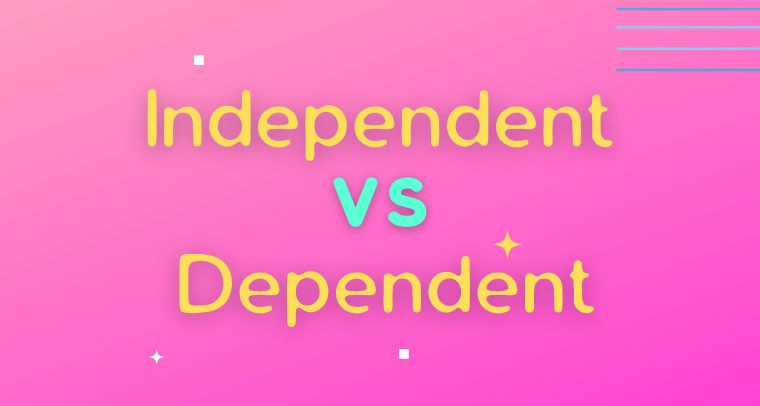Independent vs. Dependent Clauses
Most people do not know the difference between an independent clause and a dependent clause. An independent clause is a complete sentence; it has a subject and a verb and expresses a complete thought. While A dependent clause is not a complete sentence; it cannot stand alone. It must be attached to an independent clause to make sense.
What is an independent clause?
An independent clause is a group of words that contains a subject and verb, stands on its own, with no other clauses joining it, as in:
- I like to read books.
The word “like” acts as the subject of this sentence. The verb “to read” is what does all the work in telling us what we should do next—that is, go out and buy some books! Similarly, here’s another example:
My brother went to college because he wanted to learn more about his future career options. He was accepted into his dream school despite being from a poor family who couldn’t afford tuition fees themselves! However, if you look at these two sentences together side by side (as opposed to one after another), then you’ll notice something interesting: both start with an independent clause but end up with dependent ones instead!
What is a dependent clause?
A dependent clause is a sentence that can’t stand alone as a sentence. It must be attached to an independent clause (the main part of the sentence) to form a complete sentence. Dependent clauses may be noun clauses, verb clauses, or adjective clauses.
Noun Clauses
A noun clause is a type of dependent clause that contains both the subject and verb of the main clause but does not perform any function within it. For example: “The house has been painted green.” The house doesn’t have any meaning on its own; it just performs its function in other words such as “painted” or “has”. This kind of construction is often used when talking about things like people’s names or places where they live/go etcetera…
Independent vs. Dependent Clauses: What’s the Difference?
The key difference Is that Dependent clauses are introduced by a subordinating conjunction. In other words, they’re not complete sentences on their own and require another sentence to complete them. The most common subordinating conjunctions are “because,” “although,” “while,” “after all,” etc. For example:
- I was late because I had to wait for my friend who was late as well.
- Although it was cold outside, we decided to go out anyway since we hadn’t seen each other in ages and there were so many things we wanted to do together!
Examples of independent clauses
An independent clause is a sentence that can stand alone as a complete thought. It has a subject and verb, and the main clause of the sentence may contain additional information not related to the subject or verb.
An example of an independent clause would be: “I went home after work.” This simple sentence contains only one idea (i.e., I went home), so it is considered an independent clause because it can stand alone as its complete thought.
It’s also possible for an entire sentence to be an independent clause if all parts are essential parts of its meaning; for example: “My cat walked across my foot while sleeping on my bed last night.” In this case, if you were to remove “and” from this sentence (as many grammarians suggest), there would still be enough information remaining from which someone could identify what happened with their pet cat.*
Examples of dependent clauses
- A phrase or clause that cannot stand alone as a sentence.
- A phrase or clause that is introduced by a subordinating conjunction.
Examples of dependent clauses are usually found in the beginning or middle of sentences and include those that cannot stand alone as complete sentences, such as “The cat jumped over the fence.” A dependent clause may also be used to make more complex sentences, such as “The cat jumped over the fence and ran away.”
Independent vs. dependent clauses are different types of sentences
Independent and dependent clauses are different types of sentences. The key difference is that Independent clauses can stand on their own, while dependent clauses cannot. For example, the following sentence contains an independent clause:
- I like the taste of chocolate milk.
The word “chocolate” is independent because it doesn’t have anything else connected to it (like “milk”). It stands alone and tells you what’s happening in this sentence: I like drinking chocolate milk! The same goes for “the taste.” If you wanted to add another word after “taste,” such as “of” or “in,” then they would be considered dependent words and should be attached to something else within the same sentence instead of standing alone as above.”
Conclusion
In summary, although both dependent and independent clauses are important in writing, they serve different purposes. Independent clauses can stand alone as sentences, while dependent clauses cannot. Dependent clauses often begin with words like “although,” ” since,” “if,” or “when.” In order to avoid confusion, it is important to know how to use each type of clause correctly and to revise your work so that each clause is serving its intended purpose.
